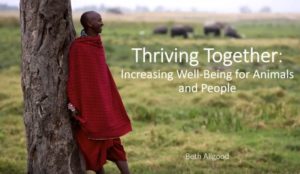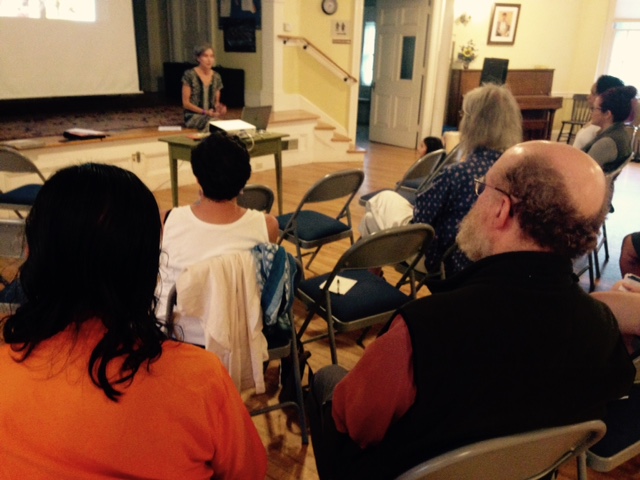By Julie Kumble This past July, in the middle of making a cross-country bike journey, I…
Our happiness and animals – the inextricable link.
Do animals make us happy?
Most people would answer “yes”. Why else the proliferation of internet cat videos, or baby animal memes posted all over Facebook and message boards. Most of us feel a connection to animals such that even a picture of a furry or feathered creature sleeping will make us smile – or at least frown less.
But the link between animals and human happiness is much deeper than that. Indeed, let’s look at it from another angle: imagine a world without any animals. No companion animals sharing our homes, no wild animals in our trees, streams, and oceans, no farm animals, no pollinators…
 Animals not only cause us to be happy, they are essential to our happiness because they are fundamental to our very existence.
Animals not only cause us to be happy, they are essential to our happiness because they are fundamental to our very existence.
In our homes, our furred and feathered friends bring great joy and comfort; studies consistently show that people who live with pets have better mental and physical health outcomes than those who do not[i]. And anyone who has ever sunk onto the sofa after a tough day only to have a cat curl up purring on their lap, or a dog rest a loving head and paw across their knee, can tell you that the stress of life begins to seem less intense in those moments.
Human beings depend on balanced, healthy ecosystems
Native wildlife certainly enriches those of us who enjoy the outdoors. But even for those who don’t animals are vitally important. Wildlife is an essential part of the ecosystems we all rely upon for our very survival. Over the vastness of time, we have all evolved together on this planet we share to occupy our own niche. From the earthworm breaking down leaves and aerating the soil so that plants can better grow, to the tiny pollinators buzzing among the flowers, allowing those plants to fruit, to the mighty elephants that pull down trees to bring new light to shaded areas, and fertilize the soil with their dung. Each of us has a place, and each of us depends on the others.
Look to the wolves of Yellowstone. Grey Wolves were nearly eradicated by overhunting in the early 20th century. When they were reintroduced to the ecosystem something amazing happened: all of Yellowstone rebounded[ii]. Deer and elk that had lazed by the river, overgrazing the area, began to move around to avoid predation. That allowed riparian trees like aspen to rebound, bringing songbirds back to nest as the new trees grew. The river banks regenerated with native grasses, allowing rivers to regain their native courses. Beaver returned to the park. Balance was restored.
Human beings depend on balanced, healthy ecosystems: they provide us with food, water, air… even medicine. And of course, they can provide us with intangible benefits as well – a sense of wellbeing, of peace.
Thriving Together: Increasing Wellbeing for Animals and People
Wildlife conservation, animal welfare, human happiness, and a resilient planet are inextricably linked. Human communities cannot thrive without other species and planetary health thriving as well. The International Fund for Animal Welfare (IFAW) has been studying the link between animals and human wellbeing for many years. Join Beth Allgood, US Director, as she takes you through the evolution of IFAW’s work on this topic.
However we choose to look at them, animals are an inextricable part of the greater whole. Without them, we could not be happy. We could not be at all.
[i] See, e.g. https://newsinhealth.nih.gov/2018/02/power-pets
[ii] https://www.yellowstonepark.com/things-to-do/wolf-reintroduction-changes-ecosystem



